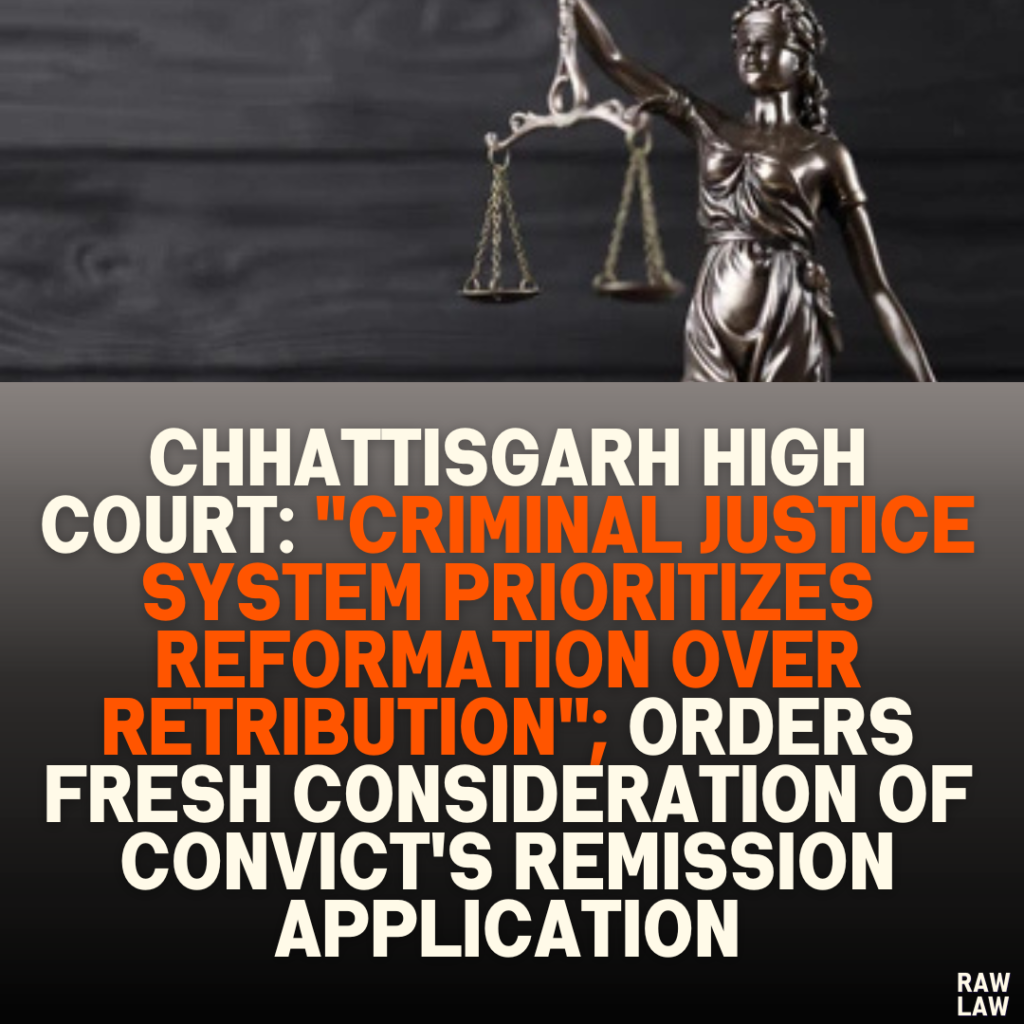Court’s Decision
The High Court allowed the petitioner’s writ petition and quashed the rejection of his remission application. The court held that the impugned order was “non-speaking” and lacked application of mind. It directed the State Government to reconsider the application in light of established legal precedents, emphasizing reformative justice. The court also ordered the State to obtain a fresh opinion from the Additional Sessions Judge and complete the decision-making process within a set timeline.
Facts
- The petitioner, convicted under Sections 147 and 302/149 of the Indian Penal Code (IPC), was sentenced to life imprisonment in 2015 by the Additional Sessions Judge, Dantewada.
- In 2024, the petitioner applied for remission of his sentence under Section 432 of the Criminal Procedure Code (Cr.P.C.).
- The Superintendent of Central Jail, Jagdalpur, forwarded the remission application to the trial court for its opinion.
- However, the State Government rejected the application outright, citing Rule 358(3)(g)(Two) of the Chhattisgarh Prisons Rules, 1968, which excludes convicts sentenced under Sections 302/149 IPC from remission eligibility.
Issues
- Was the rejection of the remission application consistent with legal principles and natural justice?
- Can Rule 358(3)(g)(Two) validly bar consideration of remission for certain categories of convicts, particularly under Sections 302/149 IPC?
- Did the State adequately evaluate the petitioner’s post-conviction conduct and other relevant factors?
Petitioner’s Arguments
- The petitioner contended that the rejection was arbitrary and contrary to the principles of reformative justice established by the Supreme Court.
- He argued that the decision ignored his post-conviction conduct and other factors required to assess eligibility for remission.
- The petitioner relied on Rajo alias Rajwa alias Rajendra Mandal v. State of Bihar (2023 SCC OnLine SC 1068), which highlights the need for individualized consideration of remission applications and the reformative goal of punishment.
- He also cited Joseph v. State of Kerala (2023 SCC OnLine SC 1211), where the Supreme Court held that blanket exclusions based on executive policies are arbitrary and violate constitutional principles.
Respondent’s Arguments
- The State defended its decision by invoking Rule 358(3)(g)(Two) of the Chhattisgarh Prisons Rules, which excludes convicts sentenced under Section 302/149 IPC from remission eligibility.
- It argued that the rejection of the application was consistent with this rule and did not warrant further review.
Analysis of the Law
The court analyzed relevant legal principles:
- Reformative Justice: Citing Rajo alias Rajwa alias Rajendra Mandal, the court emphasized that the criminal justice system prioritizes reformation over retribution. This requires assessing the convict’s post-conviction behavior, socio-economic background, and potential for reintegration.
- Individualized Assessment: The court stressed the importance of individualized evaluations in remission applications, rejecting rigid application of rules that undermine the constitutional mandate of Articles 14 (equality before the law) and 21 (right to life and personal liberty).
- Judicial Oversight: The court reiterated that administrative decisions like remission must be based on reasoned analysis and must align with established legal principles.
Precedent Analysis
The court relied on the following judgments:
- Rajo alias Rajwa alias Rajendra Mandal v. State of Bihar (2023): This case underscored the necessity of considering post-conviction conduct and socio-economic factors in remission cases.
- Joseph v. State of Kerala (2023): The Supreme Court invalidated blanket exclusions of certain offences from remission eligibility, deeming them arbitrary and inconsistent with reformative justice.
- Laxman Naskar v. Union of India (2000): This judgment laid down criteria for evaluating remission, including the convict’s behavior, family ties, and potential for reintegration.
- Sangeet v. State of Haryana (2013): The court emphasized that sentencing and remission decisions must align with the reformative goals of the justice system.
Court’s Reasoning
The High Court found the State’s rejection of the petitioner’s remission application flawed on several counts:
- Non-Speaking Order: The impugned order lacked substantive reasoning and failed to address the petitioner’s arguments or post-conviction behavior.
- Rigid Application of Rules: The court observed that Rule 358(3)(g)(Two), as applied by the State, unduly restricted the petitioner’s right to be considered for remission. It held that such rigidity is contrary to judicial principles and undermines reformative justice.
- Violation of Natural Justice: The rejection order did not consider the petitioner’s conduct in prison or other relevant factors, violating principles of fairness.
Conclusion
The court set aside the rejection order and remitted the matter to the State Government for fresh consideration. It directed the State to:
- Obtain a fresh opinion from the Additional Sessions Judge within one month.
- Decide the petitioner’s remission application within two months of receiving the opinion.
- Ensure that the decision is guided by relevant Supreme Court judgments and reformative justice principles.
Implications
This judgment reinforces key principles of reformative justice in remission cases:
- Individualized Assessments: The decision underscores the importance of evaluating remission applications based on individual circumstances rather than blanket exclusions.
- Judicial Oversight: It highlights the judiciary’s role in ensuring administrative decisions comply with constitutional and legal principles.
- Fair Process: The ruling mandates that remission decisions be reasoned, fair, and aligned with the reformative goals of punishment.
By emphasizing these principles, the judgment sets a precedent for future cases, ensuring that administrative decisions do not undermine the constitutional rights of convicts.




Pingback: Delhi High Court Rules Services Under NFS Project Exempt From Service Tax, Highlights Discriminatory Treatment and Violation of Article 14, Affirms Mega Exemption Notification Covers Defence-Related Infrastructure Projects - Raw Law